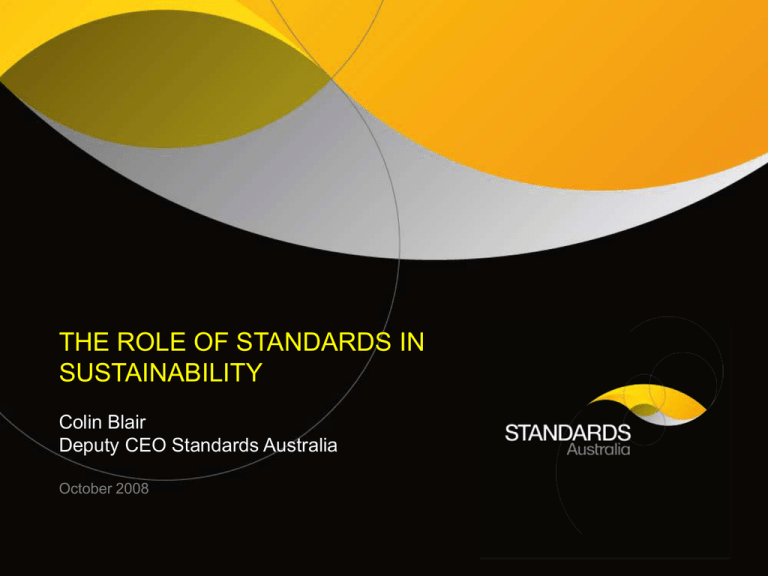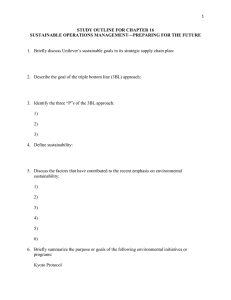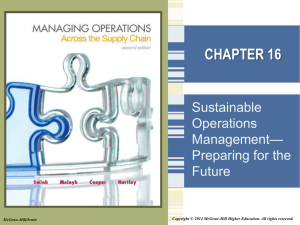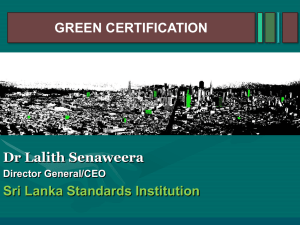THE ROLE OF STANDARDS IN SUSTAINABILITY Colin Blair Deputy CEO Standards Australia
advertisement

THE ROLE OF STANDARDS IN SUSTAINABILITY Colin Blair Deputy CEO Standards Australia October 2008 Outline Three dimensions of sustainability: economic growth; environmental integrity; and social equity Greenhouse standards Environmental Labelling Environmental management and design Energy efficient technologies Sustainable buildings coordination group ISO/TC 59/SC 17 Sustainability in building construction Three dimensions of sustainability Economic growth Provide tools for business transactions and eliminating barriers to trade, consolidating innovation, and contributing to interoperability and the dissemination of new technologies and best practices. The “toolbox” of standards for conformity assessment, which can be used to increase confidence in products and services, is also part of this contribution Environmental integrity Standards support the dissemination of environmentally friendly and energy efficient technologies and practices. There is moreover, a growing number of standards on sustainability in relation to activities such as building construction, treatment of waste, the quality of water services, and air, water and soil quality. Also standards on energy efficiency and renewable sources. Three dimensions of sustainability Social equity Standards on consumer protection, safety at work, accessibility requirements for people with disabilities. The Greenhouse Standards AS ISO 14064 suite of three standards details specifications and guidance for the organisational and projects levels and for validation and verification ISO 14065 specifies accreditation requirements for organisations that validate or verify resulting GHG emission assertions or claims AS ISO 14064 and ISO 14065 provide an internationally agreed framework for measuring GHG emissions and verifying claims made about them so that "a tonne of carbon is always a tonne of carbon“ AS ISO 14064 and ISO 14065 thus support programmes to reduce GHG emissions and also emissions trading programmes Environmental Labelling As part of the ISO 14000 series of environmental standards, the International Organization for Standardization has drawn up a group of standards (ISO 14020 to 14025) specifically governing environmental labelling. Environmental claims made by a company or selfdeclared environmental claims, are often not verified. This in turn leads to confusion in the market for the consumer. Unfounded environmental claims are counter-productive to environmental consideration of a product and service. The development of ISO 14021, in particular, is intended to provide an international harmonisation of widely used self-declared environmental claims and declarations that would serve as an alternative to regulations. Environmental management and design (ISO 14000) ISO 14001:2004 Environmental management systems – Requirements with guidance for use, contributes to any organisations objectives to operate in an environmentally sustainable manner. The ISO 14000 family includes supporting tools for environmental management and designing environmentally friendly products and services: ISO 14004:2004 Environmental management systems – General guidelines on principles, systems and support techniques. ISO 14040:2006 Environmental management – Life cycle assessment – Principles and framework. Energy Efficient Technologies Solar Test methods for solar collectors (AS/NZS 2535.1:2007) Solar and heat pump water heaters (AS/NZS 2712:2007 ) Wind Wind turbines - Design requirements for small wind turbines (AS 61400.2(Int)-2006) Wind turbines - Measurement and assessment of power quality characteristics of grid connected wind turbines (AS 61400.21-2006) Water efficient products Water efficient products - Rating and labelling (AS/NZS 6400:2005) Performance of showers for bathing (AS/NZS 3662:2005) Rainwater Tank Design and Installation Handbook (HB 2302006) Energy Efficient Technologies Minimum energy performance standards (MEPS) Refrigerated display cabinets (AS 1731.14-2003) Power transformers (AS 2374.1.2-2003) Performance of electrical appliances - Airconditioners and heat pumps (AS/NZS 3823.2:2005) Performance of external power supplies (AS/NZS 4665.2:2005) Electric water heaters (AS/NZS 4692.2:2005) Double-capped fluorescent lamps (AS/NZS 4782.2:2004) Energy Efficient Technologies Lighting Double-capped fluorescent lamps (AS/NZS 4782.2:2004) Incandescent lamps for general lighting services (AS/NZS 4934.2(Int):2008) Electrical Products Performance of household electrical appliances - Dishwashers ( AS/NZS 2007.1:2005) Performance of household electrical appliances - Clothes washing machines (AS/NZS 2040.1:2005) Performance of household electrical appliances - Rotary clothes dryers (AS/NZS 2442.2:2000) Sustainable buildings coordination group Is a coordination group with an overseeing role. It does not develop standards but liaises with a broad range of committees to direct standards development and policy preparation with relation to the issue of sustainability of buildings. Sustainable buildings coordination group Its Primary Function is to provide coordination advice to committees within the building sector that address issues surrounding sustainability. The group will aim to ensure that sustainable solutions will be practical, affordable and at a minimum effective level. The coordination group will also provide advice to Standards Australia regarding priority projects for these committees. The co-ordination group's roles include: Ensuring coordination of standards development activities in the area of sustainability across all Standards Australia activities. Coordination with Government and Industry initiatives (e.g., Australian Sustainable Built Environment Council). Identification of any new key areas requiring consensus or other solutions. Sustainable buildings coordination group List of SA committees relevant to sustainability in buildings has been prepared List of Australian Standards that may impact on the ability to build sustainable buildings is being prepared A building sustainability checklist has been prepared. The main purpose of the checklist is to equip relevant technical committees with the necessary information to address issues pertaining to the sustainability of the built environment Glossary of terms is being developed ISO/TC 59/SC 17 ISO/TC 59/SC 17 Sustainability in building construction France has the Chairmanship & Secretariat Australia is a participating member There are five working groups - WG 1 General principles and terminology WG 2 Sustainability indicators WG 3 Environmental declaration of products WG 4 Environmental performance of buildings WG 5 Civil engineering works ISO/TC 59/SC 17 Published standards - ISO 15392:2008 Sustainability in building construction - General principles ISO/TS 21929-1:2006 Sustainability in building construction - Sustainability indicators Part 1: Framework for development of indicators for buildings ISO 21930:2007 Sustainability in building construction -- Environmental declaration of building products ISO/TS 21931-1:2006 Sustainability in building construction -- Framework for methods of assessment for environmental performance of construction works -- Part 1: Buildings ISO/TC 59/SC 17 Work program - ISO/DIS 21931-1 Sustainability in building construction -- Framework for methods of assessment for environmental performance of construction works -- Part 1: Buildings ISO/AWI TR 21932 Buildings and constructed assets -- Sustainability in building construction -- Terminology THANK YOU





